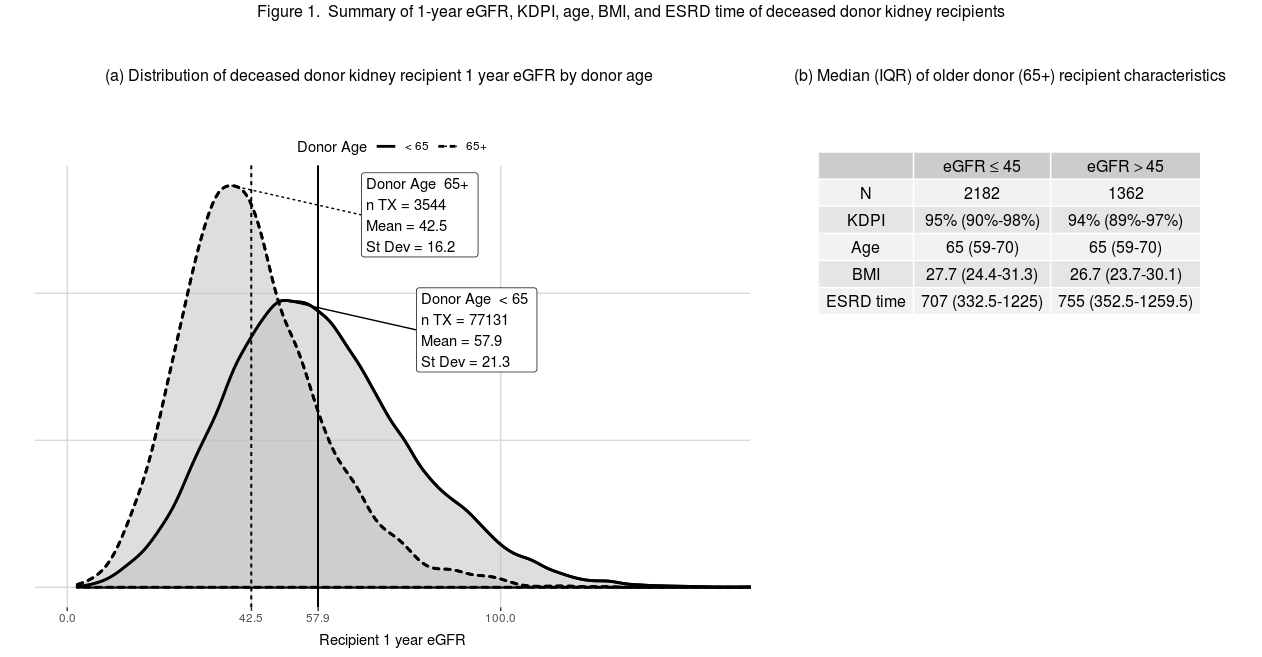Can National Data Predict Which Older Kidney Donors Are More Likely to Yield Higher eGFR 1-Year Post-Transplant?
1United Network for Organ Sharing, Richmond, VA, 2University of Minnesota, Minneapolis, MN
Meeting: 2019 American Transplant Congress
Abstract number: B153
Keywords: Graft function, Kidney, Prediction models
Session Information
Session Name: Poster Session B: Kidney Donor Selection / Management Issues
Session Type: Poster Session
Date: Sunday, June 2, 2019
Session Time: 6:00pm-7:00pm
 Presentation Time: 6:00pm-7:00pm
Presentation Time: 6:00pm-7:00pm
Location: Hall C & D
*Purpose: Older donors (65+) have been utilized at low rates despite accounting for the majority of deaths in the U.S. (73%, CDC). Kasiske et al. (2011) showed that eGFR>45 at 1 year post-transplant is strongly associated with “better” longterm kidney function. The ability to identify older donors that yield kidneys with eGFR>45 at 1 year post-transplant could expand the donor pool and improve quality of life for these candidates.
*Methods: Analyses utilized kidney alone transplants (OPTN 2000-16) from adult (18+) deceased donors and recipients with allocation CPRA < 10 and no previous transplant. The 1-year eGFR was calculated using CKD-EPI. First-year deaths and graft failures, plus those missing eGFR data, were removed from the cohort. Recipient characteristics were compared to see univariate differences in the transplants function from older donors. Prediction models were built using the same covariates as the SRTR 1-year kidney graft outcome models. Logistic regressions predicted eGFR as a categorical variable (eGFR >45 or not). The C-statistic is reported to describe model discrimination. Models were fit using all donors and again for older donors only. In both cases, full models were fit and reduced by removing non-significant (p>0.05) covariates. KDPI and recipient age, BMI, and ESRD time were analyzed amongst older donors by 1 year eGFR group using the Mann-Whitney U test.
*Results: First-year graft failure rates were 9.4% for all donor ages (n=89349) and 17.3% for the older donors (n=4289). Of younger donors (<65), 71.1% had eGFR>45 while 38.4% of older donors had eGFR>45 (Figure 1a). The mean eGFR between younger and older donors was significantly different (p<0.001). Prediction performance was worse for older donors than for all donors (C=0.73 and C=0.60, respectively). Older donor recipients by eGFR (Figure 1b) were significantly different across KDPI and recipient BMI (p<0.001) and not recipient age (p=0.61) or ESRD time (p=0.16). Although statistically significant, the actual differences were small between eGFR groups for KDPI and BMI.
*Conclusions: Kidneys from elder donors can provide excellent longterm function, but not in the majority of donations. However, as deaths occur much more frequently in people >65, it is incumbent that means to accurately identify them be found. The inability to accurately predict outcomes after transplantation of kidneys from older donors limits their predictable use for the benefit of waitlisted people. As older donors are the greatest number, it is crucial that we be able to identify donors with good functioning kidneys.
To cite this abstract in AMA style:
Custer CA, Carrico RJ, Pruett TL. Can National Data Predict Which Older Kidney Donors Are More Likely to Yield Higher eGFR 1-Year Post-Transplant? [abstract]. Am J Transplant. 2019; 19 (suppl 3). https://atcmeetingabstracts.com/abstract/can-national-data-predict-which-older-kidney-donors-are-more-likely-to-yield-higher-egfr-1-year-post-transplant/. Accessed July 14, 2025.« Back to 2019 American Transplant Congress

